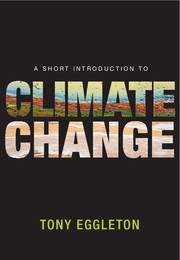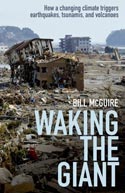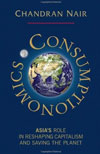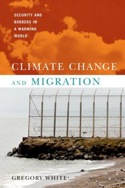 Tony Eggleton’s A Short Introduction to Climate Change is an excellent account of climate science for the general reader. The author is a retired geology professor from the Australian National University. Two widely read climate change deniers, Ian Plimer and Bob Carter, are also retired Australian geology professors, but Eggleton is not of their ilk. He comes at the subject from a concern about climate change and a wish to explain to readers who are uncertain about the topic why there is reason for concern.
Tony Eggleton’s A Short Introduction to Climate Change is an excellent account of climate science for the general reader. The author is a retired geology professor from the Australian National University. Two widely read climate change deniers, Ian Plimer and Bob Carter, are also retired Australian geology professors, but Eggleton is not of their ilk. He comes at the subject from a concern about climate change and a wish to explain to readers who are uncertain about the topic why there is reason for concern.
The book is grounded in the careful science which has contributed to our understanding of the danger in which we now stand. Eggleton has not worked in the field of climate, but recognises the authenticity of the findings of climatologists. His opening chapter, The Spirit of Enquiry, offers a clear account of the process by which science across all its fields advances. He highlights the fact that most climate science is done by groups, all of whom need to be confident of the reliability of their colleagues. He explains the rigorous process of peer reviewed papers and the comprehensive scrutiny from fellow scientists which follows their publication. He ponders the fact that some hypotheses are of the type that involves a choice between only two possibilities. If one is not true the other must be so. How will the theory of climate change caused by the burning of fossil fuels be viewed in 100 years from now? “Interpretations evolve, change and sometimes settle into accepted fact: the Sun is at the centre of the solar system, the continents have drifted and smoking does damage the lungs.”


 It’s only if we fail to grasp the enormity of the threatened impacts of climate change on the global environment that we can scoff at the notion that even volcanic eruptions and earthquakes may be triggered as a consequence of our continuing to burn fossil fuels. Not that it’s an easy consequence to appreciate, but vulcanologist
It’s only if we fail to grasp the enormity of the threatened impacts of climate change on the global environment that we can scoff at the notion that even volcanic eruptions and earthquakes may be triggered as a consequence of our continuing to burn fossil fuels. Not that it’s an easy consequence to appreciate, but vulcanologist 
